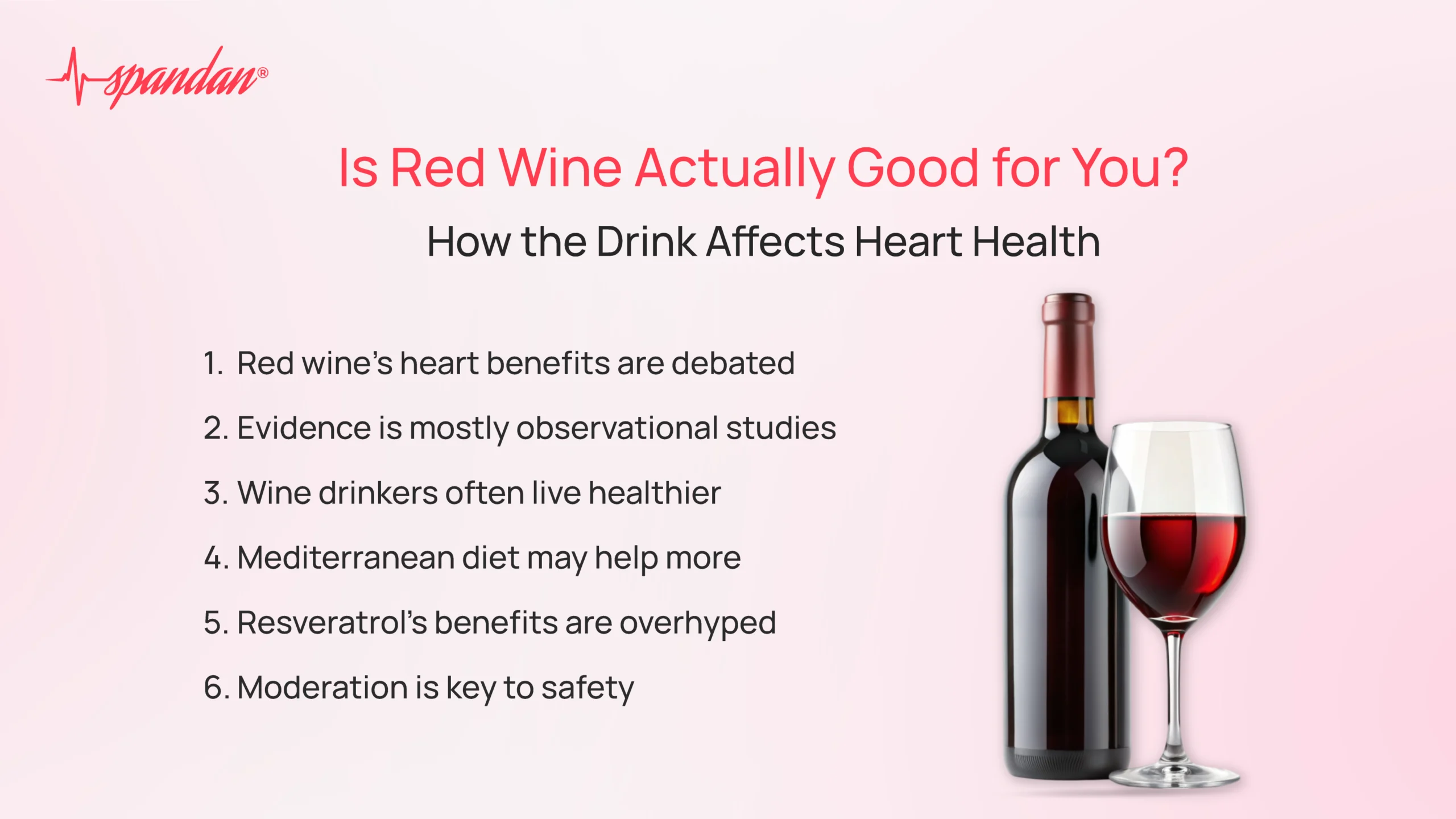
Related Article
Author:- Mr. Ritesh Sharma
Table of Contents
Is Red Wine Actually Good for You? If you’ve ever poured yourself a glass of cabernet or pinot noir and said, “Well, it’s good for my heart,” you’re not alone. The idea that red wine benefits heart health has been popular since the late 1980s when the concept of the French Paradox first emerged. This theory suggests that despite their high-fat diet, the French enjoy low rates of heart disease, and red wine may be the reason why.
But how true is this widely held belief? Let’s explore what science says about whether red wine is truly a heart-healthy drink.
The French Paradox: Debunked or Supported?
The French Paradox arose from the observation that despite indulging in rich foods, the French seem to have lower rates of heart disease compared to other countries. Initially, researchers speculated that their frequent consumption of red wine might explain this discrepancy. The key to wine’s purported heart benefits lies in compounds called polyphenols, found in red and purple grape skins, which include resveratrol. These compounds are known for their antioxidant properties, potentially improving cardiovascular health.
However, many experts, including Dr. Kenneth Mukamal, an internist at Harvard-affiliated Beth Israel Deaconess Medical Center, argue that the evidence is far from definitive. Studies suggesting that moderate alcohol consumption (including wine) lowers heart disease risk are observational. That means they only show associations—not cause and effect.
So, is red wine actually good for you? The answer is more complicated than a simple yes or no.
Wine vs Other Alcohol: Does It Matter?
It’s often said that wine, particularly red wine, is better for heart health than other alcoholic beverages like beer or hard liquor. However, research does not consistently support this notion. A review published in Circulation in 2017 found that while some studies do suggest wine may offer more cardiovascular benefits than beer or spirits, others do not.
The question is red wine actually good for you gets more muddled because wine drinkers tend to have healthier lifestyles overall. For example, people who drink wine often pair it with meals, which itself could contribute to better heart health, rather than the wine alone. These confounding factors make it difficult to determine whether wine itself or the habits of wine drinkers explain any perceived health benefits.
The Mediterranean Diet and Wine: What’s the Role?
The Mediterranean diet, which emphasizes fruits, vegetables, nuts, whole grains, and healthy fats, is well-known for its heart-protective properties. Red wine is also a feature of this diet, which has led some to speculate that it plays an important role in warding off heart disease.
But again, is red wine actually good for you in the context of the Mediterranean diet? It’s hard to say. Dr. Mukamal points out that it’s impossible to know whether wine is an essential part of the diet’s benefits. The overall eating pattern, rather than any single component like wine, is more likely responsible for the reduced heart disease risk.
Resveratrol: Miracle Compound or Overhyped?
Much of red wine’s heart-healthy reputation stems from resveratrol, a polyphenol believed to have antioxidant and anti-aging effects. Research in animals, especially mice, has shown promising results regarding resveratrol’s ability to improve heart health. However, human studies have not demonstrated the same benefits.
In fact, a 2014 study of adults in Italy found no connection between resveratrol levels and heart disease rates. What’s more, the amount of resveratrol found in red wine is minuscule. You’d need to drink a staggering number of glasses daily to match the doses used in animal studies, which is neither practical nor healthy. This brings us back to the question: Is red wine actually good for you if you’re drinking it for resveratrol? The evidence suggests that it’s not.
Is Red Wine Actually Good For You?
Even if the heart health benefits of red wine remain uncertain, moderate drinking is still considered relatively safe. For women, moderate drinking is defined as up to one drink per day, and for men, up to two drinks per day. However, starting at age 65, men should limit themselves to one drink daily, as the body’s ability to metabolize alcohol diminishes with age. So, if you’re asking is red wine actually good for you, the answer depends on moderation.
In short, is red wine actually good for you? While some studies suggest red wine may offer certain heart-health benefits, the evidence is far from conclusive. Much of the research is observational, meaning it shows associations, not cause and effect. Wine drinkers tend to have healthier lifestyles, which could explain the lower rates of heart disease often seen in this group.
Rather than relying on red wine as a magic elixir for heart health, focus on maintaining a healthy lifestyle. That includes a balanced diet, regular exercise, and if you enjoy red wine, keeping it in moderation.
Finally, keep in mind that alcohol affects individuals differently, especially as we age. Before you pour that next glass, consider: is red wine actually good for you, or is it just a myth wrapped up in a nice story?
In conclusion, while the concept of red wine as a heart-healthy drink may have a certain appeal, the science behind it is still uncertain. So, next time you raise your glass, enjoy it, but don’t rely on it for your heart health.





